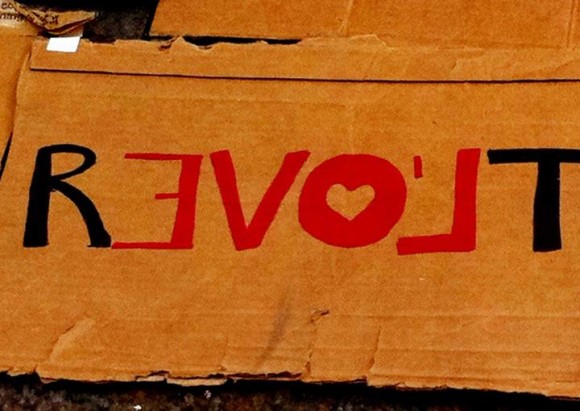I recently came across an extraordinary video titled, “The Revolution is Love.” In this short clip, Charles Eisenstein shares his view that a foundational cause of the Occupy Wall Street demonstrations is the unmet human need for love, connection and meaning. He identifies the Occupy movement as being a response to the profound alienation that we experience in a world economy where people are, for most practical purposes, interchangeable and expendable. “It’s really hard to create community,” he observes, “if the underlying knowledge is, ‘we don’t need each other.'”
 Eisenstein points out that much of what passes for community in 21st century American society is little more than shared consumption. Rather than mutual self-giving and reliance on others, we meet together in our supposed self-sufficency. But this kind of interaction does not bring us into true community. “Joint consumption doesn’t create intimacy,” he concludes. “Only joint creativity and gifts create intimacy and connection.”
Eisenstein points out that much of what passes for community in 21st century American society is little more than shared consumption. Rather than mutual self-giving and reliance on others, we meet together in our supposed self-sufficency. But this kind of interaction does not bring us into true community. “Joint consumption doesn’t create intimacy,” he concludes. “Only joint creativity and gifts create intimacy and connection.”
Eisenstein believes that the Occupy movement represents an awakening on the part of many: That we exist not in order to consume, but instead to give, create and love. He suggests that we have the opportunity to participate in a society-wide shift in consciousness. This change could include not only the ninety-nine percent, but also the one percent, who are just as trapped in this life-denying system as the rest of us.
 This is good news to the millions of Americans who are suffering from loneliness and depression. It is good news to the office workers who spend their daylight hours in windowless buildings working to keep their underwater mortgages afloat. This is – amazingly enough – good news to corporate executives and wealthy financial speculators. It is good news, even if many of us cannot recognize it yet.
This is good news to the millions of Americans who are suffering from loneliness and depression. It is good news to the office workers who spend their daylight hours in windowless buildings working to keep their underwater mortgages afloat. This is – amazingly enough – good news to corporate executives and wealthy financial speculators. It is good news, even if many of us cannot recognize it yet.
Above all, it is good news to the poor. It is good news that we are being invited to recognize the gifts of all people – including the jobless, the homeless, and those living with disabilities. We are awakening to the good news that there is a place for all of us. Each one of us has a precious gift to offer the world.
How does this all play out, though? A friend recently asked me what good this movement does, in practical terms, for the poor and oppressed. It is great, she said, if your heart is full of love – but how does this make any difference for those who are suffering the worst abuse and neglect that our society is capable of dealing out? Is this, after all, just another spiritual trip for privileged people – or is it truly good news for everyone?
 These are essential questions. Will this movement be mostly about venting our anger at the increasing marginalization of the middle class, or will we take this opportunity to stand in true solidarity with those who have been suffering the burdens of poverty for decades – even centuries? Will this be primarily a bourgeois movement of band-aid reform, or will we have the courage to push for total liberation? Does the life of the homeless person matter as much as that of the bankrupted middle class family or indebted university student?
These are essential questions. Will this movement be mostly about venting our anger at the increasing marginalization of the middle class, or will we take this opportunity to stand in true solidarity with those who have been suffering the burdens of poverty for decades – even centuries? Will this be primarily a bourgeois movement of band-aid reform, or will we have the courage to push for total liberation? Does the life of the homeless person matter as much as that of the bankrupted middle class family or indebted university student?
If we are to be a movement that truly embodies a call for liberation for all people, we must learn how to love. We will need to learn how to be vulnerable, putting people before convenience. We must re-discover genuine community, where everyone is valued for the gifts that they bring. Sociability and similar patterns of consumption are not enough.
 Are we ready for a world in which people are valued for who they are, rather than what they can buy? Are we prepared to humble ourselves and provide for the needs of the poor and marginalized, sharing our gifts freely with others? Can we learn to trust that God will bless us through the poor; that they, too, have something priceless to offer?
Are we ready for a world in which people are valued for who they are, rather than what they can buy? Are we prepared to humble ourselves and provide for the needs of the poor and marginalized, sharing our gifts freely with others? Can we learn to trust that God will bless us through the poor; that they, too, have something priceless to offer?
Are we ready for a love that trumps our convenience and comfort?
